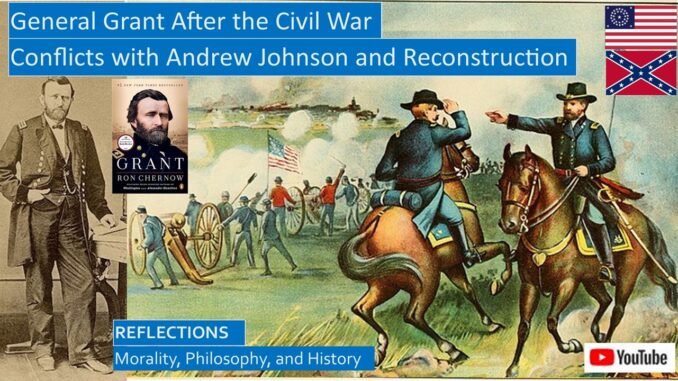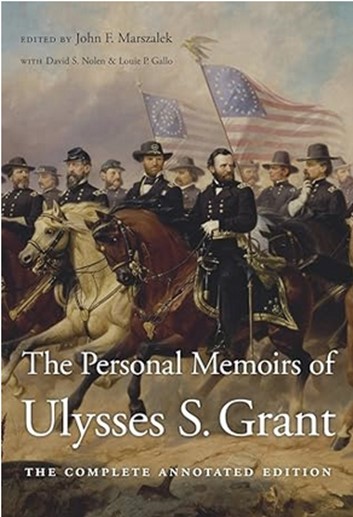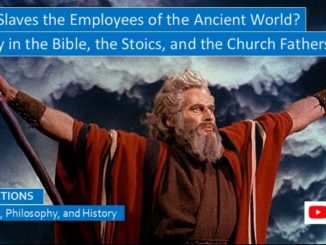
As commanding general-in-chief after the end of the Civil War, was Grant effectively the acting President presiding over the former Confederate states?
Why did Mr and Mrs Grant decline Lincoln’s invitation to accompany them to the Ford’s Theater?
Why was Congress so eager to strip President Andrew Johnson of his executive powers? Was Johnson a Southern sympathizer?
Why did Johnson veto the Reconstruction Acts, only to have Congress override most of his vetoes?
Why was General Grant drafted to be the Presidential Candidate of the Republican Party in 1868?
YouTube video for this blog: https://youtu.be/9OJnW4hAizI
LINCOLN AND GRANT: LIBERAL SURRENDER TERMS AT APPOMATTOX
Robert E Lee was compelled to surrender his Army of Virginia at Appomattox because they were running short on food for both men and horses, and ammunition, and because Grant’s Army prevented their escape to the West. Ulysses S Grant was known as Unconditional Surrender Grant, and although his surrender was unconditional, the terms of the surrender were surprisingly lenient. Although the ordinary soldiers would give up their arms, Confederate officers could keep their sidearms, and officers and artillerymen could keep their horses to help with spring planting. In addition, the Union army provided rations to feed their Confederate brothers, and Grant permitted the defeated Confederate soldiers to ride the military railroads home free of charge. In his memoirs, Grant said that “Lee remarked that this would have a happy effect” on his men.[1] Indeed, this gracious treatment of their former enemies gained the gratitude of Robert E Lee and many in the defeated South.
Robert E Lee Surrendering to Grant at Appomattox, Ending the American Civil War
https://seekingvirtueandwisdom.com/surrender-at-appomattox-courthouse-ending-the-american-civil-war/
https://youtu.be/_Dr7qia6XkQ
Years later, Robert E Lee denied that Grant had won the war due to fortunate circumstances, saying: “We all thought Richmond, protected as it was by our splendid fortifications and defended by our army of veterans, could not be taken. Yet Grant turned his face to our capital, and never turned it away until we had surrendered. Now, I have carefully searched the military records of both ancient and modern history, and have never found Grant’s superior as a general.”


Our biographer Ron Chernow states that “the Civil War had” “dwarfed anything in American history. It claimed 750,000 lives more than the combined total losses in all other wars between the Revolutionary War and the Vietnam War. The historian James McPherson has calculated that, as a portion of the total population, the Civil War killed several times as many American soldiers as World War II.” The toll in life was greatest in the South, “where more than one-fifth of the southern male population had perished.” Slaves were the most valuable assets held in the South, but this wealth disappeared after four million slaves were emancipated.[2]
The European powers took advantage of the Civil War. France had installed an Austrian prince as Emperor Maximillian over Mexica, but the French abandoned Mexico when Grant dispatched Sheridan’s army to the Mexican border. The French did not want to battle what was the largest army in the world near its borders.
Spain also dabbled in the affairs of Santo Domingo, which first sought to become a colony of Spain, then the United States, to protect them from Haiti, their stronger neighbor on the island of Hispaniola. Spain also disentangled itself from Santo Domingo when the Union armies won the Civil War. As President, Grant was strongly in favor of granting American statehood to Santo Domingo, but those in Congress and the American people did not want to annex a Catholic, Spanish-speaking country.
General Grant’s Memoirs, Civil War Diplomacy, Post-War Events in Mexico and Santo Domingo
https://seekingvirtueandwisdom.com/general-grants-memoirs-civil-war-diplomacy-post-war-events-in-mexico-and-santo-domingo/
https://youtu.be/14xYWgYmb10
When Grant was invited to a weekly cabinet meeting, he was applauded. Although Lincoln “was eager to absorb ex-Confederate states back into the Union by December and restore normal trade relations with them, he had decided not to recognize existing rebel governments, although he admitted, ‘We can’t undertake to run State governments in all these Southern states. Their people must do that, though I reckon that at first some of them may do it badly.’” Stanton suggested a plan of military rule for the interim.
Chernow tells us: “The discussion turned to Appomattox and Grant’s pledge to Robert E Lee that defeated soldiers would not be prosecuted for treason so long as they abided by their paroles.” Regarding the ordinary soldiers, Lincoln smiled as Grant explained, “I told them to go back to their homes and families, and they would not be molested, if they did nothing more.” Lincoln said that he “hoped there would be no persecution, no bloody work, after the war was over.”
GRANT DECLINES LINCOLN’S INVITATION TO FORD’S THEATRE
The Lincolns were planning to attend the performance at Ford’s Theatre. They invited Mr and Mrs Grant, which worried Stanton, as he had been aware of threats of the assassination of Northern leaders. Lincoln dismissed Stanton’s concern that both he and Grant would attend the same performance, but Grant declined the invitation, as his wife Julia preferred to go out of town, as she did not get along with Mary Todd Lincoln.
That night, when changing trains in Philadelphia, the Grants noticed a quiet crowd in the hotel lobby. A hotel employee thrust a telegram into the hands of Ulysses S Grant. He read it somberly, then passed it to Julia. She burst into tears. Lincoln had been shot.
This was the saddest day in the life of Ulysses S Grant. He reminisced, “To know Lincoln personally was to love and respect him for his great qualities of heart and head, and for his patience and patriotism.” Because the South sorely needed Lincoln’s broad understanding, his death was “the greatest possible calamity to the country, and especially to the people of the South.” He feared for the peace process consecrated at Appomattox: “I did not know what it meant. Here was the rebellion put down in the field, and starting up in the gutters; we had fought it as war, now we had to fight it as assassination.”
After the assassination, worrying that Confederate General Joseph Johnston might resume the rebellion, Grant ordered that General Sheridan’s cavalry forces join General Sherman’s forces to cut off any escape attempt by Confederate General Joseph Johnston.
ANDREW JOHNSON’S TENNESSEE BORDER STATE BACKGROUND
Vice President Andrew Johnson was a troubled, though ambitious, politician. One journalist notes that “he was doubtless a man of unusual talents, but had too violent a temper and was too much addicted to the common Southern habit of free indulgence in strong drink.” His reputation suffered when he became drunk at Lincoln’s inaugural celebrations.
Our author Ron Chernow narrates: “Johnson was a humorless, pugnacious man, thin-skinned and vindictive, with a fiercely turbulent expression and close-set, beady black eyes. He was placed on the ticket with Lincoln in 1864, not for outstanding talent or intelligence, but because Republicans hoped to broadcast their status as a full-fledged Union party by drafting a border state Democrat from Tennessee. As the only senator from a secession state to retain his seat in the US Congress, a courageous stand that endeared him to Republicans, a heroic aura had burnished Andrew Johnson for a time.”
Andrew Johnson had a complicated relationship with the slave-holding landowners surrounding him in Tennessee. Born to poor, illiterate farmers in North Carolina, he moved to Tennessee and opened a tailor shop. He prospered, eventually owning five slaves, whom he freed in 1863 after converting to “abolitionism as a part of his vendetta against the slaveocracy, but not from any real regard for those in bondage.” He proclaimed, “Damn the Negroes, I am fighting those traitorous aristocrats, their masters.”
Before the Civil War, Johnson was elected as mayor, state legislator, Congressman, Governor, and Senator. When the Confederates in the capital city of Nashville were defeated at the beginning of the war, Lincoln appointed Andrew Johnson military governor of Tennessee.
Chernow notes, “Living among large landowners who condescended to him, he always felt like an outsider. Their patronizing attitude deposited a bitter residue in his nature, a seething resentment and profound ambivalence toward the planter class, whom he longed to ape and punish at once.”[3]
GRANT SERVING UNDER ANDREW JOHNSON, THE ACCIDENTAL PRESIDENT
Ron Chernow titled this next chapter, Soldierly Good Faith, which summarizes how Grant served under Andrew Johnson in the first years of his accidental presidency. Grant assumed a low profile, seeking to serve loyally under the new President as he did Lincoln. Chernow notes that when serving as general in Washington, “Grant grabbed a streetcar to work each morning and in fair weather pounded the pavement at a rapid clip, smoking and tipping his hat to pedestrians as he whizzed by. The cigar still served as his trademark, though he scaled back consumption from twenty per day during the war to ten, feeling virtuous in his self-restraint.”
After the end of the Civil War, General Grant worked from his office in Washington, DC, while living for a short time in Philadelphia. A troubling trend began when he accepted largesse from prominent businessmen as a just reward for his military service, including covering the costs of expensive residences or cash gifts. Later, corruption would mar his term as President.
Many in the South had difficulty reconciling themselves to the victorious North. Chernow notes the tension in Grant’s approach to the South. “As the charitable victor at Appomattox, Grant stood as the foremost symbol of a merciful attitude toward the defeated states. At the same time, as the leading Union general, fully committed to the war’s agenda of preserving the Union and ending slavery, Grant was no less concerned with protecting the four million freed people.”
What was Grant’s relationship with Andrew Johnson, the accidental president? As Chernow notes, “Grant had to deal with a new president who would swing from excessive hostility toward the South to excessive leniency, alienating him at both ends of the spectrum.” “Grant’s relationship with Johnson started out amicably despite their differing styles. Grant was circumspect and reserved, whereas Johnson blurted out oaths and tirades, heedless of the consequences. Grant disclaimed interest in politics or the presidency.”
Since “Grant was a bona fide war hero, Johnson cultivated the relationship.” “Johnson seemed not exactly to stand in awe of Grant, but anxious to conciliate rather than command.” For his part, “Grant held decidedly ambivalent feelings towards the hotheaded Johnson, finding him ‘revengeful, passionate, and opinionated.’”
Chernow continues, “Fresh from Appomattox, Grant was initially dismayed by the way Johnson lashed out at ex-rebels.” “Before long, however, he grasped the hidden psyche of Andrew Johnson and saw lurking behind his grievances against southern planters a burning wish to emulate them. Instead of punishing his social betters, he would pose as their champion to win them over.”
Indeed, Andrew Johnson held openly racist views, proclaiming: “This is a country for white men, and by God, as long as I am President, it shall be a government for white men.” He feared that poor, white Southerners would be “trodden underfoot to protect niggers.” “When Frederick Douglass came to the White House with a black delegation, Johnson” “afterward sneered: ‘He’s just like any nigger and would sooner cut a white man’s throat than not.’ Such a president could only picture southern blacks picking cotton for low wages on their former plantations.”[4]
FREED SLAVES RE-ENSLAVED BY HARSH SOUTHERN BLACK CODES
During and after the Civil War, Union generals, at first compelled by circumstances, then empowered by Congress and the President, administered the civilian governments of Southern states under military rule. Chernow notes that “Grant was drawn ever more deeply into the debate on Reconstruction. In early March 1865, the federal government assumed responsibility for aiding freed slaves through the creation of the Freedmen’s Bureau. Since it was set up as a War Department agency, drawing funds and staff from it, Grant was directly involved in its operations. The bureau’s mandate was to feed, clothe, and educate former slaves, providing them with medical supplies and legal protection, relocating them on more than 850,000 acres of land the federal government came to control during the war.”
Granting a plot of land to former slaves ensured their independence from their former harsh masters. But this important reform was undone when “Johnson issued an order that allowed southern whites to recapture land confiscated from them during the war, a move that made him heroic to whites while dealing a crushing blow to black hopes. It forced freedmen to abandon the forty-acre plots they had started to work, turning the men into powerless sharecroppers, bound to land owned by whites. Within weeks, a white delegation from the former Confederacy rushed to the White House to express ‘sincere respect’ for Johnson’s desire ‘to sustain Southern rights in the Union.’”
Chernow continues, “By the end of 1865, so-called Black Codes” passed by Southern State legislatures “began to forge a new caste system, a segregated world where freed slaves worked as indentured servants, subject to arrest if they left jobs before the annual contracts expired. It was a cruel new form of bondage, establishing the foundations of the Jim Crow system that later ruled Southern race relations.”
For example, “In South Carolina, blacks were confined by law to their plantations, forced to work from sunup to sundown. In Florida, blacks who showed disrespect to their bosses or rode in public conveyances reserved for whites could be whipped and pilloried. In Mississippi, it became a criminal offense for blacks to hunt or fish, heightening their dependence upon white employers.” Meanwhile, the Thirteenth Amendment abolishing slavery became effective in December 1865.[5]
GENERAL GRANT SUPPORTS RADICAL RECONSTRUCTION
When the new Congress met in December of 1865, there was a backlash against the policies of Johnson’s lenient Presidential Reconstruction that favored the rights of the conquered white plantation class rather than the freed slaves. The onerous Black Codes enacted by the Southern state legislatures and the election of former Confederate officials to Congress offended Northern Congressmen and voters. Northerners asked themselves the question: Who really won the Civil War? Was the blood of Union soldiers shed in vain?
In Congress, “Radical Republicans advanced the arguments that Confederate states, by seceding, had relinquished their former rights as sovereign states and should be treated like territories, their terms of readmission defined by Congress,” refusing “to seat new southern congressmen or admit their states back into the Union.” The lenient Presidential Reconstruction was replaced by the harsher Congressional Radical Reconstruction.
Congress set up a Joint Committee on Reconstruction. Chernow writes that in their hearings investigating Southern violence against “so-called carpetbaggers, tens of thousands of young northerners who flocked southward to earn money and aid freed people. They built schools and churches, bought plantations, and often risked their lives to assist blacks. In Southern mythology, they would be demonized as corrupt parasites, but many were motivated by idealism and paid a steep price for their courage. Southern whites who supported Reconstruction, called scalawags,” also faced Southern hostility.
Chernow continues: “Carpetbagger harassment was tame compared with the outright terror inflicted on blacks. One former Louisiana slave testified that whites flogged blacks as if they were still enslaved, and that more than two thousand had been killed around Shreveport in 1865 alone. Blacks enjoyed little recourse from local sheriffs, who were often Confederate veterans and seldom acted against whites charged with crimes against blacks. It grew patently obvious that southern blacks could count on protection only from federal troops.” There were reports of white supremacist night riders terrorizing and lynching blacks in the dark of night.
In February, Johnson outraged the Radical Republicans when he vetoed the bill extending the Freedmen’s Bureau, that veto was quickly overridden. Next, his veto of a civil rights bill nullifying the black codes and granting full citizenship to anyone born in the United States, including blacks, was quickly overridden. Johnson thought this civil rights bill was a case of reverse discrimination which oppressed states’ rights.
As Chernow puts it, “In the face of a recalcitrant president, General Grant was rapidly emerging as the foremost protector of persecuted southern blacks.” Grant investigated a brutal race riot in Memphis where forty-eight blacks were killed, seventy were injured, and five black women were raped in three days.
Southern police joined in the riot, “gathering a mob of white citizens, some outfitted in Confederate uniforms,” “proceeding to shoot, beat, and threaten every Negro” they encountered. “The next day, these white vigilantes set ablaze black schools, churches, and homes,” “chanting calls for a white man’s government as they spread mayhem.” The Memphis Avalanche editorialized, “Thank heaven the members of the white race are once more the rulers of Memphis.”
Ron Chernow documents other instances of over-the-top murderous brutality that General Grant confronted, including when white supremacists attacked a black convention in New Orleans where both black marchers and blacks who prayed for mercy were shot, stabbed, and mutilated. Some had their skulls bashed in with bricks. Grant responded by placing New Orleans under martial law to keep the peace.
In other videos, we reflected on how entire Southern communities united in terrorizing blacks and anyone who sought to improve their condition, as told in the book The Bloody Shirt: Terror After the Civil War.
Chaos of Reconstruction, Terror After the Civil War
https://seekingvirtueandwisdom.com/chaos-of-reconstruction-terror-after-the-civil-war/
https://youtu.be/ZEX050eTn38
We also reflected on how the former Confederate General Longstreet, who became a Republican supporting Reconstruction after the Civil War, battled insurrectionists on the streets of New Orleans.
Terror During Reconstruction, White League Confronts General Longstreet and Union Army
https://seekingvirtueandwisdom.com/terror-during-reconstruction-white-league-confronts-general-longstreet-and-union-army/
https://youtu.be/bF3w2RrSaM0
How did Congress react against this recalcitrance of the former Confederates? Chernow writes: “Radical Republicans enacted the centerpiece of their legislative efforts to defend freed blacks, passing the Fourteenth Amendment, which engraved in the Constitution the principle of equal citizenship before the law regardless of race. It declared that all persons born or naturalized in the United States enjoyed both federal and state citizenship and prevented states from denying freedoms mandated by the Bill of Rights.”
Chernow continues, “Seeking to scotch the Black Codes, it denied states the right to deprive ‘any person of life, liberty, or property, without due process of law’ and guaranteed all citizens ‘equal protection of the laws.’ Andrew Johnson, who now gloried in taunting Congress, not only opposed the amendment, but urged southern states to reject it, which they did. Nevertheless, the Fourteenth Amendment was ratified in July 1868,” assisted by the requirement that the Confederate states were required to pass it before being readmitted into the Union.
Although at the Confederate surrender at Appomattox Grant sought to reconcile with the South, he sensed that the South was in no mood for reconciliation. He suggested that the Southern states should be permitted back into the Union only after they adopted the Reconstruction Amendments.
Grant further advised that “troops must be kept at all the principal points in the South for some time to come. This will be necessary to repress the turbulence of a class of the South very dangerous to well-disposed persons, and also to protect the rights of the freedmen, who are looked upon with deep hatred by a large proportion of the Southern people.”
PRESIDENT JOHNSON REPELS GRANT AND THE RADICAL REPUBLICANS
Chernow relates: “Grant’s relationship with Andrew Johnson soon worsened. Against the warnings of his advisers, the president planned a speaking tour of northern states, popularly dubbed a ‘swing around the circle,’ to publicize his pro-southern policies, berate congressional Republicans, and woo Democrats in the fall elections.” Grant thought it was his duty to accept his invitation to accompany him on the trip, which was a mistake.
This tour did not go well, “it degenerated into a public relations nightmare for the president, showcasing the coarse, vulgar side of his nature. Some observers thought he was frequently drunk, and Senator John Sherman snickered that the trip has ‘sunk the Presidential Office to the level of a Grog House.’ When angry crowds heckled him, the boorish Johnson lashed out in return. As Johnson aired his disgust with Radical Republicans and expressed disdain for blacks, Grant, feeling mortified and exploited, attempted to shrink into the background.”
Saying his health was suffering, Grant returned to Washington. The tour that was intended to boost Johnson’s popularity instead sparked a spontaneous boom for Grant to run for President. The tour so damaged Johnson’s credibility that it led to stunning gains for the Radical Republicans in the fall elections, giving them veto-proof margins in both houses of Congress, and prompting the ratification of the Fourteenth Amendment.[6]
Rewarded by Northern voters with an overwhelming Congressional majority, the Radical Republicans passed and handily overrode Johnson’s veto of the First Reconstruction Act. Ten Confederate states were divided into five military districts. The general in each district had sweeping powers. These states could be readmitted into the Union only after they granted blacks the right to vote, called conventions that would draft a new state constitution, and most importantly, passed the Reconstruction Amendments. As Chernow puts it: “For many southern whites it seemed that, having endured wartime defeat, they now had to submit to a second military humiliation.”
Grant thought that this legislation was necessary. “With military oversight of the South and district commanders reporting directly to him, Grant now wielded unprecedented power over the region, probably more domestic power than any other general-in-chief in American history. In enforcing the new legislation, he increasingly took his cues from Congress and bypassed an intransigent president.” In a very real sense, Grant was acting almost like the President of the former Confederacy.
Suspecting that President Johnson was a Southern sympathizer, and that he planned to fire Edwin Stanton, the Secretary of War, to hinder the enforcement of the Reconstruction civil rights legislation, Congress passed the Tenure of Office Act, declaring that the President could not fire cabinet members without the consent of the Senate. Further legislation tried to prevent Johnson from issuing orders directly to the army, compelling him to go through Grant, and further said Grant could be dismissed only with the consent of the Senate. These measures may not have been constitutional, though they seemed to be a continuation of the Civil War through legislation.
Then Congress passed the Second Reconstruction Act that empowered the military governors to supervise Southern elections, allowing them to register black voters, infuriating Johnson and the Southerners. Later, the Third Reconstruction Act confirmed the power of the generals to dismiss local officials who obstructed Reconstruction, and who obstructed due process and voting rights for blacks. Johnson vetoed both of these acts, and again Congress promptly overrode his vetoes. After that, the Fifteen Amendment was passed and ratified, guaranteeing all American citizens, including former slaves, the right to vote. The Southern states were also required to ratify this amendment to rejoin the Union.
Confederate veterans in Johnson’s Tennessee responded by founding the Ku Klux Klan, recruiting Confederate General Nathan Bedford Forrest as a titular leader. Chernow writes: “To hide their identities, Klansmen donned outlandish white hoods to terrorize their former slaves into believing they represented the ghosts of dead Confederate soldiers.” These nightriders “carried out murders and mutilations in a grotesque spirit of sadistic mockery.” But especially in the small plantation towns, “the freedmen often knew and feared the identities of their tormenters.”[7]
Conventions began to meet in the former Confederate states, many with black majorities, to draw up new constitutions. About eighty percent of the black delegates were literate, but there were enough illiterate and ignorant black delegates to provide fodder for the Southern white supremacist press. These conventions pursued civil rights, established schools, desegregated public transportation, and guaranteed voting rights of former slaves.
As Chernow puts it: “Such a spectacle was anathema to many terrified whites, prompting the Charleston Mercury to jeer at this assembly as the ‘Congo Convention.’” “The united power of blacks, carpetbaggers, and scalawags produced a stunning string of Republican election victories in fall 1867 across a region long solidly Democratic,” with astonishing black voter turnout.
ANDREW JOHNSON IS IMPEACHED BY CONGRESS
When Andrew Johnson asked Edward Stanton to resign, Stanton refused. Johnson then appointed Grant to be the interim Secretary of War. Why did Grant agree to this appointment? Though he doubted the constitutionality of the Tenure Act, he told Johnson he should comply with it until the Senate or Supreme Court reviewed it. Grant further told him that he would resign in favor of Stanton once Johnson was overruled. But as a subordinate of the President, as a military man respecting the lines of command, Grant felt he should comply. However, in his first Cabinet meeting, he made clear that he supported and would enforce the Radical Reconstruction legislation passed by Congress.
When the new Congress convened in November, the House Judiciary Committee voted by a 5 to 4 vote to impeach President Johnson. When the Senate overwhelmingly voted to restore Stanton as Secretary of War, Grant vacated his interim position. In the upcoming political struggle, as Chernow relates, “The worse things looked for Andrew Johnson, the brighter was the political future for Grant. In early February, the New York Republican Convention endorsed Grant for President.”
During the Senate trial, Grant argued privately with Congressmen on the need to convict Johnson, but he thought it would be inappropriate for him to appear during the Senate trial. Chernow puts it best: “During the war, Grant had learned that it was better to let power seek him rather than to pursue it; a good general waited to be summoned by his superiors.”
In the end, Johnson was acquitted by one vote. Seven Republicans in total voted to acquit, as they did not think that Johnson’s actions were not the high crimes and misdemeanors that the Constitution declared were needed for impeachment.[8] Ulysses S Grant would handily win the 1868 Presidential election, and Grant’s Presidency will be featured in a future reflection.
YOUTUBE
PREVIOUS REFLECTIONS
Previous reflections have examined the history of the Civil War and Reconstruction from differing perspectives. Eric Foner’s Second Founding examines the history of the Reconstruction Amendments themselves, and how the Confederate states were readmitted into the Union and examines the Jim Crow years that followed and the Supreme Court opinions that neutered these amendments for a hundred years.
WEB DuBois studied how blacks helped the Union win the Civil War, and how Reconstruction was a flowering of democracy and civil rights that would be reawakened in the civil rights struggles of the Sixties under the JFK and LBJ administrations. This is now the predominant interpretation of post-Civil War history, as our Yale Lecture Notes series attest.
Many people are unaware that over ten thousand blacks were lynched in the hundred years after the Civil War. Not only were prosecutions rare, but often Southern sheriffs were part of these lynchings. Some lynchings occurred after church so more people could attend and celebrate them.
Second Founding: The Reconstruction Amendments to the Constitution, by Eric Foner
http://www.seekingvirtueandwisdom.com/second-founding-the-reconstruction-amendments-to-the-constitution/
https://youtu.be/UciDV5laOLg
Refuting the Lost Cause: Black Reconstruction by WEB Du Bois
http://www.seekingvirtueandwisdom.com/refuting-the-lost-cause-black-reconstruction-by-web-dubois/
https://youtu.be/JeRCM4PAqPk
Post-Civil War Reconstruction and Redemption History, Yale Lecture Notes
http://www.seekingvirtueandwisdom.com/post-civil-war-reconstruction-and-redemption-history-yale-lecture-notes/
https://youtu.be/f5nPNnvDBCY
Ida B Wells, Journalist, Brave Woman, and Anti-Lynching Activist
http://www.seekingvirtueandwisdom.com/ida-b-wells-journalist-brave-woman-and-anti-lynching-crusader/
https://youtu.be/sLDHs0AigvY
Previously during the Civil War, General Grant showed the same leniency and basically the same terms of unconditional surrender to the Confederates defeated at Vicksburg, Mississippi as he later offered at Appomattox, correctly reasoning that most of them were tired of fighting and would return to their wrecked farms. The Confederate defeats at Vicksburg and Gettysburg both occurred on July 3rd, 1863, shifting the momentum of the war to the Union side.
One of the Civil War letters described the desperate plight of cavalry horses in the Civil War, which we compared to how horses fared in ancient armies, and later on the streets of New York City. We invite everyone to view the history of the Civil War through paintings and the occasional early photograph.
Siege of Vicksburg: Ordinary Union Soldiers and Generals Grant and Sherman Recount the Struggle
https://seekingvirtueandwisdom.com/siege-of-vicksburg-ordinary-union-soldiers-and-generals-grant-and-sherman-recount-the-struggle/
https://youtu.be/U6KNO6IkVQs
Gettysburg: Ordinary Soldiers and Generals Pickett and Longstreet Remember the Bloody Charges
https://seekingvirtueandwisdom.com/gettysburg-ordinary-soldiers-and-generals-pickett-and-longstreet-remember-the-bloody-charges/
https://youtu.be/ibTm3l-C8VQ
Horses and Cavalry from Xenophon in Ancient Greece to the American Civil War, and in New York City
https://seekingvirtueandwisdom.com/horses-and-cavalry-from-xenophon-in-ancient-greece-to-the-american-civil-war-and-in-new-york-city/
https://youtu.be/lB6x-__GHy4
Civil War Struggle Through Paintings
http://www.seekingvirtueandwisdom.com/civil-war-struggle-through-paintings/
https://youtu.be/2hoBOSOBUP8
DISCUSSING THE SOURCES
Ron Chernow’s biography, Grant, topped the best-seller list of non-fiction books for several months, starting in late 2017. Historically, Grant had been near the bottom of the lists of effective Presidents, in part because of the corruption of his fellow Cabinet officials and subordinates. Chernow also held this opinion until he started researching the life of Grant. He realized that Grant was underestimated by prior historians who bought into the Lost Cause mythology that the Civil War was fought for states’ rights rather than slavery, and that Reconstruction was a mistake. But Grant was a popular President for many of his contemporaries, who appreciated how difficult it was to attempt to protect the civil rights, voting rights, and due process for freedmen during Reconstruction.[9]
Ron Chernow covers topics we skipped over, such as:
- How Confederate General Johnston surrendered his army to Union General Sherman.
- How Grant prevented Robert E Lee from being prosecuted for treason.
- How General Sheridan, military governor of Louisiana and Texas, enforced the civil rights acts and the laws that outlawed the KKK and other white supremacist terrorist groups.
- The political maneuvering surrounding the impeachment of Andrew Johnson.
When searching through the political cartoons, we found several depicting Secretary of State William Seward’s purchase of Alaska for $7.2 million dollars under the Johnson administration. This was known as Seward’s Folly, for what could possibly be found in Alaska?[10]
[1] The Personal Memoirs of Ulysses S Grant (Cambridge, MA, Belknap Press of Harvard University Press, 2017, originally 1877), Chapter 67, p. 724.
[2] Ron Chernow, Grant (New York: Penguin Books, 2017), Chapter 23, Dirty Boots, pp. 508-518.
[3] Ron Chernow, Grant, Chapter 24, A Singular, Indescribable Vessel, pp. 519-532.
[4] Ron Chernow, Grant, Chapter 25, Soldierly Good Faith, pp. 545-554.
[5] Ron Chernow, Grant, Chapter 25, Soldierly Good Faith, pp. 562-566.
[6] Ron Chernow, Grant, Chapter 26, Swing Around the Circle, pp. 567-581.
[7] Ron Chernow, Grant, Chapter 26, Swing Around the Circle, pp. 583-592.
[8] Ron Chernow, Grant, Chapter 27, Volcanic Passion, pp. 593-612.




1 Trackback / Pingback